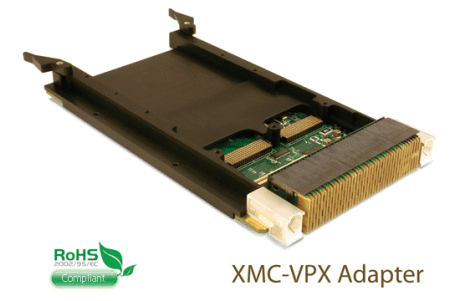Features
- Adapt one XMC module to a 3U OpenVPX VITA 65 system
- VITA42 XMC site
- VITA65 OpenVPX compatible
- Configurable mapping for VPX to XMC communications ports
- Configurable Digital IO with VITA 46.9 maps
- XMC P16 mapped as X38s
- XMC JN4 mapped as P64s
- System management using IPMI
- Dual SMB buses
- Power, temperature monitoring
- Extended environment ratings
- -40 to +85C operation
- 40g shock
- 0.1 g2/Hz random vibration
- Conduction cooling
- Heat-spreading frame with direct path to host
- VITA20 conduction cooling
- Air Cooling
- flow-through air path
- heat-spreading for improved convection effectiveness
- Supports 0.8 inch slot spacing
- 2 level maintenance REDI covers availableVPX-XMC Conduction-Cooled Adapter Assembly with REDI covers available
Overview
The VPX-XMC module adapter allows a single width XMC module to be used in a 3U OpenVPX slot. The adapter is available in either conduction-cooled or air-cooled models.
The VPX-XMC adapter is designed for use in harsh environments. Environmental ratings for temperature, vibration and shock are available for demanding in military, heavy industry, and aerospace applications.
The adapter has configurable port mappings between the XMC and the VPX host ports A through D. This flexible mapping allows the XMC module to work with a variety of system topologies and backplanes.
Digital IO from the XMC is mapped to backplane connector P2 from either J16 or Jn4 according to VITA 48.10 standard. The mapping is jumper selectable on the adapter. Optional connections for trigger and clock features for X3 and X6 module families are provided.
No software is required to operate the adapter unless IPMI functions are required. All configurations may be set without IPMI. Applications requiring system management functions for health monitoring and control use the IPMI interface, an independent dedicated processor on the card.





